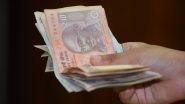Berlin, Nov 30 (AP) Members of Germany's junior governing party have chosen a left-leaning duo as its new leaders, a decision that could endanger the future of Chancellor Angela Merkel's troubled coalition.
Norbert Walter-Borjans and Saskia Esken beat the rival team of Vice Chancellor Olaf Scholz and Klara Geywitz in a runoff ballot of the Social Democrats' members, according to results announced Saturday.
Walter-Borjans and Esken won the support of 53 per cent of members who voted, with just over 45 per cent supporting their rivals.
Their appointment still needs the formal approval of a party congress next week, which also is expected to consider whether the party should stay in the "grand coalition" of Germany's traditional big parties led by the center-right Merkel.
While Scholz and Geywitz strongly favored staying in the coalition, Walter-Borjans and Esken have sounded much more skeptical and advocated changes to the coalition agreement.
The Social Democrats have been without an elected leader since Andrea Nahles quit in frustration nearly six months ago. The party decided to ask its 426,000-strong membership who should take on the task of pulling it out of a lengthy poll slump.
The new leaders aren't household names to many Germans.
Walter-Borjans is best-known for a 2010-2017 stint as finance minister of North Rhine-Westphalia, Germany's most populous state, during which regional authorities purchased data on potential tax cheats with money hidden in Swiss bank accounts.
Esken is a federal lawmaker.
Esken said after Saturday's announcement that none of the would-be leaders had been “great friends” of the coalition and noted that all had said they didn't want to extend it beyond the end of the current parliamentary term, currently due in 2021.
But she and Walter-Borjans — who unlike some contenders eliminated in the first round of voting haven't clearly advocated a fast exit — left open what exactly their position will be on the coalition's future.
"We didn't let ourselves be nailed down to the question of everything coming down to the question of fleeing (the coalition) or staying in permanently," Walter-Borjans said.
"We have said clearly that this is about substance; we have said that we must do more on climate, we have said that there must be massive investment," he said.
"We will once again name the points that are important to us and then have the party congress decide what can wait, and what must be implemented so urgently that we raise the question of the coalition because of it," he added.
Scholz, who is also Germany's finance minister, vowed his support for the leaders-elect. He said after the vote that the party has made a decision "and all must rally behind it."
Paul Ziemiak, the general secretary of Merkel's Christian Democratic Union, said he looked forward to "trusting cooperation for the good of our country."
"We want to govern Germany well, we created a basis for that and this internal decision by the Social Democrats has changed nothing about the basis of the 'grand coalition,'" he said.
The Social Democrats have provided three of Germany's eight post-World War II chancellors but have served as junior partners in three of Merkel's four governments since 2005. They joined the current coalition only reluctantly last year after Merkel was unable to put together an alternative alliance.
Polls currently show support for the Social Democrats at 13 or 14 per cent.
That compares with their already poor showing of 20.5 per cent in the 2017 election; support for Merkel's Union bloc is about twice as high and the Social Democrats also have fallen behind the Greens, traditionally smaller rivals on the left.
Merkel has said that this will be her final term. The next election is currently due in the fall of 2021 but there have long been questions over whether the coalition will last until then. (AP)
(This is an unedited and auto-generated story from Syndicated News feed, LatestLY Staff may not have modified or edited the content body)












 Quickly
Quickly




















